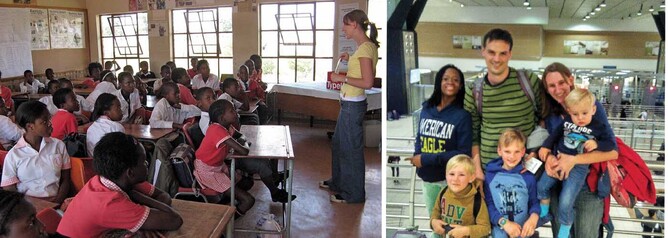I arrived in Africa the day before my 21st birthday; fresh out of university, brimming with optimism and fervour and with only a 23kg suitcase (and as much carry-on as I had been able to cram in my little backpack) to my name. I had (with, in fairness, just the slightest bit of trepidation) turned down a coveted job-offer from Education Queensland after my teaching degree was completed, traded my life savings for a plane ticket, and fulfilled all the requisite requirements for joining OM (Operation Mobilisation) and their six-month missions preparation school in Pretoria, South Africa.
I was also single.
Before leaving Australia, I had read in one of the books assigned to me by OM Australia that something like 80% of unmarried missionaries are women. Aside from raising the obvious question of “Where are all the men?” (I mean, come on, fellas!) the text went on to explain that the chances of an unmarried lady arriving on the mission field and then meeting and marrying a single male missionary were pretty slim. Choosing to be obedient to my Lord, and follow Him to South Africa, meant more than just sacrificing opportunities for a good career, pleasant lifestyle and secure future in Australia — I had to surrender to Him even the deep desire of my heart, to one day marry and have children.
On arriving in Africa, however, I discovered that the opportunities available to an unmarried, young person in missions are actually quite fantastic. Over the course of the next two years, though unlike the Son of Man I at least had modest accommodations to lay my head, I lived out an exciting, itinerant kind of ministry. One day I would be in a rural village, serving alongside home-based care workers visiting the homes of people living with HIV/AIDS; the very next day, in an urban township school, running evangelistic programs in classrooms packed with 50-60 eager and noisy kids. I must have racked up hundreds of kilometres on potholed roads around South Africa, and into neighbouring Namibia, Botswana, Zimbabwe and even, a few terrifying times, over Kariba Dam to Zambia. I slept in tents, mud-huts, numerous family homes, and once, in Zimbabwe, in the remains of what must have been once quite a grand old hotel (although water had long since ceased to flow into the bathroom pipes). Maybe I am recollecting things wrongly, but it is as if I never even got tired…
I also saw, on many occasions, the fruit of the work with which I was busy. I think God perhaps was being especially gracious to me during those first few early years on the mission field; it was not easy to become discouraged when it was so very evident that the Lord was moving and doing great wonders, both through my feeble efforts and in my own heart as well.
And then my life changed. I met Herman, who was also working for OM in South Africa, and conceded (to myself and God only, at that stage) that he was quite possibly the most amazing bloke I’d ever encountered. Apparently, he kind of liked me too, because, according to company policy, he requested permission of my ministry leaders and sending field to take me out for coffee (this will make a great story for the grandkids one day!). Approval was quickly granted, and a year later we were married — beginning a new chapter of our lives and ministries together.
Life as young-married missionaries was, I don’t believe, any less exciting than singledom, but it was certainly different. A couple of months after marriage, I remember having a long discussion with a dear, older mentor/friend, who had grown up as a Missionary Kid in Papua New Guinea and then married her childhood sweetheart.
“Don’t,” she told me sagely, “make the mistake of trying to do ministry as if you were two, separate individuals, who happen to be married to one another.”
With both Herman and I both having built our own missionary ‘careers’ before even meeting one another, the temptation was just to continue with the many (very different) projects we each had on the go. However, we learned quite quickly that our marriage, and even our ministries, worked a lot better when we were pulling in the same direction. Perhaps we were not (and still are not) always on the same page, but we figure that so long as we are at least reading the same book, it’s a good start.
Perhaps the quantity of our missionary output did not double when the two of us became one, but I like to think that the quality did. Some of my most precious memories of our early years together are of the times we were able to collaborate on projects which were personally important to our spouse. I remember him spending a week with me in a village in KZN, together teaching church-leaders
about a Christian response to HIV; I remember how I spent late nights in his office, with him at the computer, editing literature he was developing to mobilise prayer for the nations.
Even our marriage itself was a testimony and ministry to the people around us. In a culture where husbands often don’t love their wives, the obvious care and respect Herman shows for me speaks volumes about what it means to be a follower of Jesus Christ, and to be loved by God.
And then our lives and ministries changed again.
A year after Herman and I were married, we adopted our daughter, Dimakatso. Soon after that, we welcomed a biological son…and another (and again another!). During this time, we also had the privilege of welcoming, loving, and then saying good-bye to a couple of children through foster-care. Of course, any time a couple have the privilege of welcoming a child into their hearts and homes, their world is turned upside-down (in the best, and most exhausting kind of way) and changed forever. The experience for us, of transitioning (abruptly) from married couple to family with kids (in abundance) naturally did not vary significantly from this norm.
Travel and adventure are not nearly as easy as it used to be, in our pre-kid era. Whilst we are big believers in involving our growing family, as much as possible, in our active and exciting lives, sometimes a baby just needs to be at home for a nap (and, to be perfectly honest, I sometimes feel like I kind of need it, too!). Although Herman can remain very focused and personally involved in the ministry of OM, my capacity to participate actively has changed a bit. Schooling options which we have available here on the field were not proving suitable for our kids’ needs, and so I am now heavily invested in home-education. Although, just like in our early marriage, Herman and I prioritise ‘pulling in the same direction’ ministry-wise, we have both had to accept that most of the heavy-pulling will fall on his shoulders, with me doing all I can to help and support him in carrying this load.
Sometimes it is easy for me to start feeling a little guilty, or even worried. I was sent out, by my home church, as a young, vibrant singleton, with the capacity for quite decent ministry ‘output’ in return for a (still very generous) single-adult salary, and commitment for prayer and emotional support. Now, we are a family of six (and sometimes seven), with significantly larger needs, and at times having seemingly less ability to live-out the same kind of radical, exciting adventures in mission than we once possessed. The economics of this doesn’t make a lot of sense, to be honest, if we look at it purely from a cost/benefit point of view — but I also realise that oftentimes God’s economy is different to ours.
About a week ago, I was at a large and busy local grocery store on a Saturday, hoping to pick up a few weekend bargains. I was also delightfully and uncommonly alone. Herman was busy back at the house with some project with the children, and so I had taken the opportunity to nip out quickly without anyone to try and ‘help’ me. In the bakery aisle, a lady cleaning the floors looked up from her mop-bucket, looked at me and then let her face fall, before exclaiming, “Where are all your children today!?”
I’m terrible at recognising faces, but still I truthfully cannot remember ever having seen her before — but she had seen us apparently. Our big and happy multi-racial family tends to draw attention when we are out and about (I hope for all the right reasons); and I trust that, as we interact with one another in public spaces, we are reflecting, even in some small way, the big and happy multi-racial family which God allows us all to be a part of.
Our ministry focus has shifted slightly, in this season, to be sometimes less about going ‘out there’ to preach the gospel, but more on bringing ‘the least of these’ — the hurting, the marginalised, the orphaned and those on the fringes of society — ‘in here’, into our family fold. We realise that our home, and the love shared between our family members, is perhaps one of the greatest gifts God has given to us at this time of our lives. As much as possible, then, we seek to share this gift with those around us. This is not always an easy thing to do — I am certainly not in personal possession of the gift of hospitality, although my efforts are, I hope, commendable. By living out our lives at home with an open door, open arms and a wide-open heart, we have come to see opportunities for ministry we might never have encountered as unhindered wanderers.
Should we still be on the mission-field in 10, or 20, or even 30 years, I do wonder how our lives will be different then also. Right now, I feel a bit too knee-deep in nap-times, multiplication tables and Lego to really see and imagine it clearly; but I have no doubt that, though change will inevitably come, God will use it in a special way for His glory.
by Belinda Lamprecht

